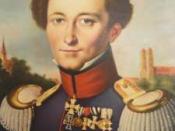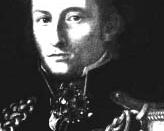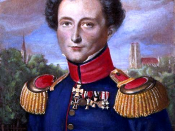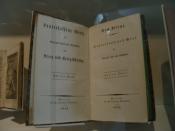Carl von Clausewitz is widely acknowledged as the most important of the major strategic theorists.
This essay will attempt to analyze Clausewitz's interrelationship between "political object" and that of "military object", and how these concepts fit into his general ideas on war as outlined in Book One of On War.
Before getting into the theoretical meanings of "political object" and that of "military object" I find it helpful to review the definition of a center of gravity as defined in physics, as Clausewitz does in his book, On War. "A center of gravity is always found where the mass is concentrated most densely." The extreme physical object in this case is a black hole, where the concentration of mass is so great, that the object, under the immense gravitational force, collapses into itself. With this in mind, Clausewitz leads the reader through a myriad of options in his search for the theoretical war definition of "center of gravity."
These options do offer precise definitions in regard to war though. Clausewitz's basic concept is that the center of gravity is "the hub of all power and movement, on which everything depends." In plain terms, you can equate the interrelationship of "political object" and that of "military object" to that of firing a weapon. The target - the desired outcome - is the political object. The military object then equates to the selection of the weapon, the selection of the ammunition for that weapon, and finally, the pulling the trigger.
Although Clausewitz defines several centers of gravity, there can be only one for each single country or collective of countries, in the case of allies. For countries with armies, then the center of gravity is the army. "In countries subject to domestic strife, the center of gravity is generally the capital. In small countries that rely on large ones, it is usually the army of their protector. Among alliances, it lies in the community of interest, and in popular uprisings it is the personalities of the leaders and public opinion." When a country is striving for a political purpose or an ideal, be it militarily or not, the center of gravity is that one thing which keeps the focus on the purpose or ideal. It is the strength of the nation; the one thing the entire country has in common with itself. It is this strength that will accomplish the mission. Clausewitz summarizes the center of gravity as the army, which is used to force the policy; the capital, which is the economic, religious, or social center of the country; or the public opinion or will of the nation, which strengthens the bond between citizens.
Now that we have defined center of gravity, what do we do with it? In a total war situation, as described in Books One and Eight, "the aim of war should be what its very concept applies-to defeat the enemy." Clausewitz is trying to point us in the right direction by giving us this definition. By focusing our energies against this center of gravity we hope to defeat the enemy. The center of gravity is that single object belonging to the enemy such that a single defeating blow to the object will essentially defeat the whole of the enemy. By finding our enemy's center of gravity, we find both his main strength and his many weaknesses. And although the weakness may seem an easy target, Clausewitz warns us not that "not by taking things the easy way-but by constantly seeking out the center of his power, by daring all to win all, will one really defeat the enemy." The center of gravity equates to the most power. It is the source of strength, power, and resistance. This primary strength gives cohesion and unity to a nation. By attacking the center of gravity we attempt to break these apart, shattering them into smaller pieces. This not only reduces the actual physical strength but also the non-visual moral (will) aspect. The reduction in strength of the center of gravity produces a rippling effect throughout the other powers, further diminishing the strength of the whole.
Clausewitz guides us further in determining what to attack. "Still , no matter what the central feature of the enemy's power may be-the point on which your efforts must converge-the defeat and destruction of his fighting force remains the best way to begin, and in every case will be a very significant feature of the campaign." With a clear direction in which to look for a center of gravity, has this been for naught? I believe that this definition and direction that Clausewitz has given us is still very applicable today. We still evaluate the enemy based on the strengths and weaknesses of the military, the political nature of the government, and the unity and opinion of the people. By finding a specific center of gravity, we attempt to break the cohesion of the military, the government, and the people. By destroying the strength we can loosen the bond between the three. An example would be a country at war that has a strong military with an effective government with the support of the people. By destroying the military, assuming the military is the center of gravity, we attempt to break the will of the people and the government. With the people unwilling to continue the present course and now unsupportive of the government, the government will be forced to discontinue war. Since the military is no longer an effective projection of political policy, the governmental power is also reduced.
This example still holds true of a government that does not have the support of the people. By destroying the military, we have reduced the projection of political policy, and again the governmental power is also reduced.
I believe that Clausewitz's concept of center of gravity, as it applies to today's war fighter, is still a valid concept. By destroying the will of a nation to continue with war, be it the government or the people, we can "compel our enemy to do our will." By assessing the enemy's primary strength, the "hub of all power and movement," we can concentrate our forces and break the cohesion.





